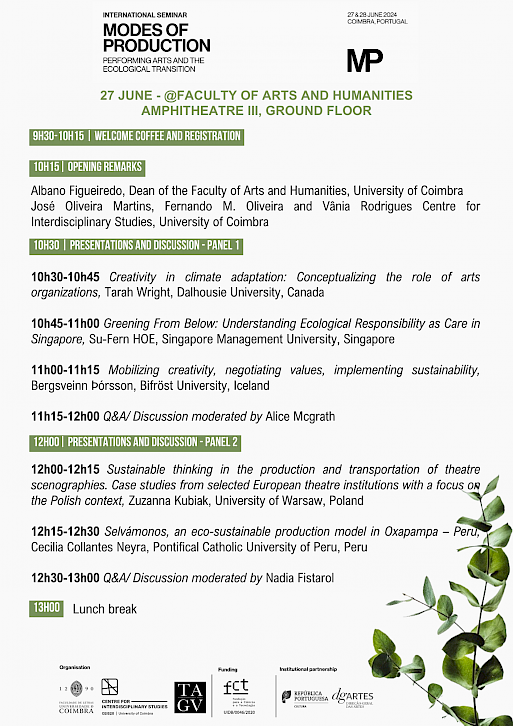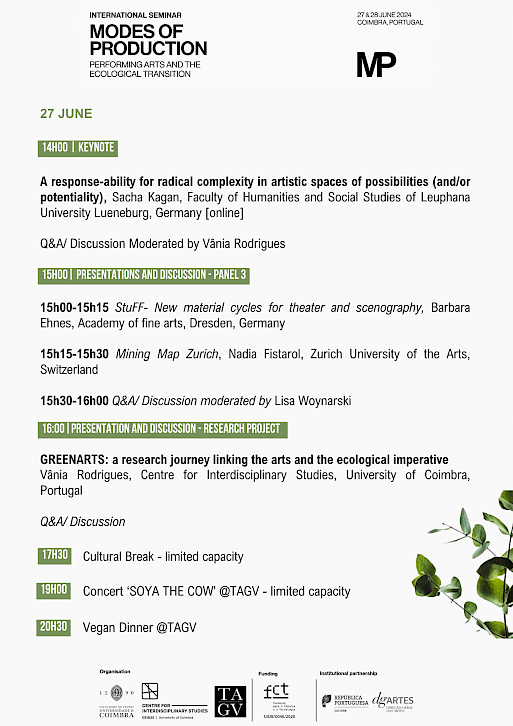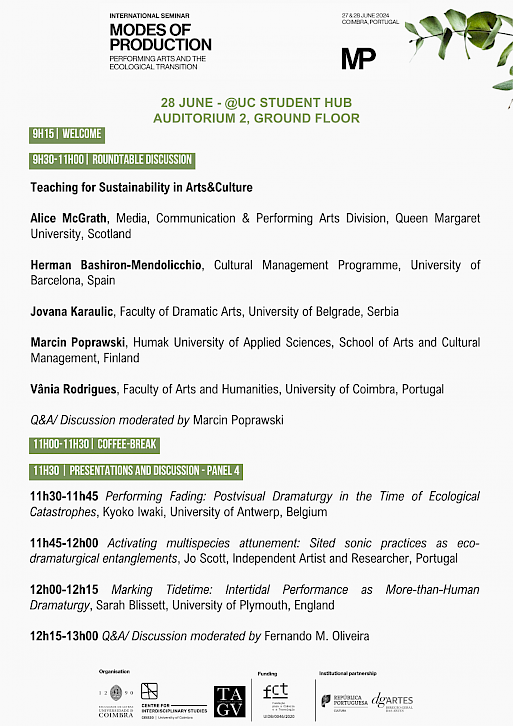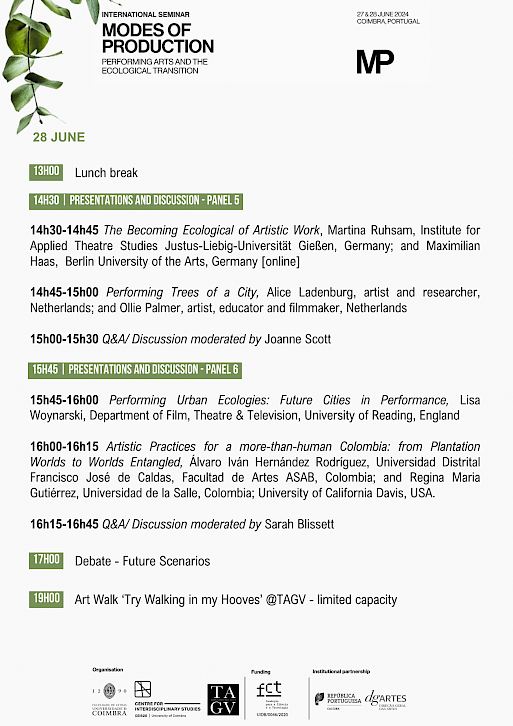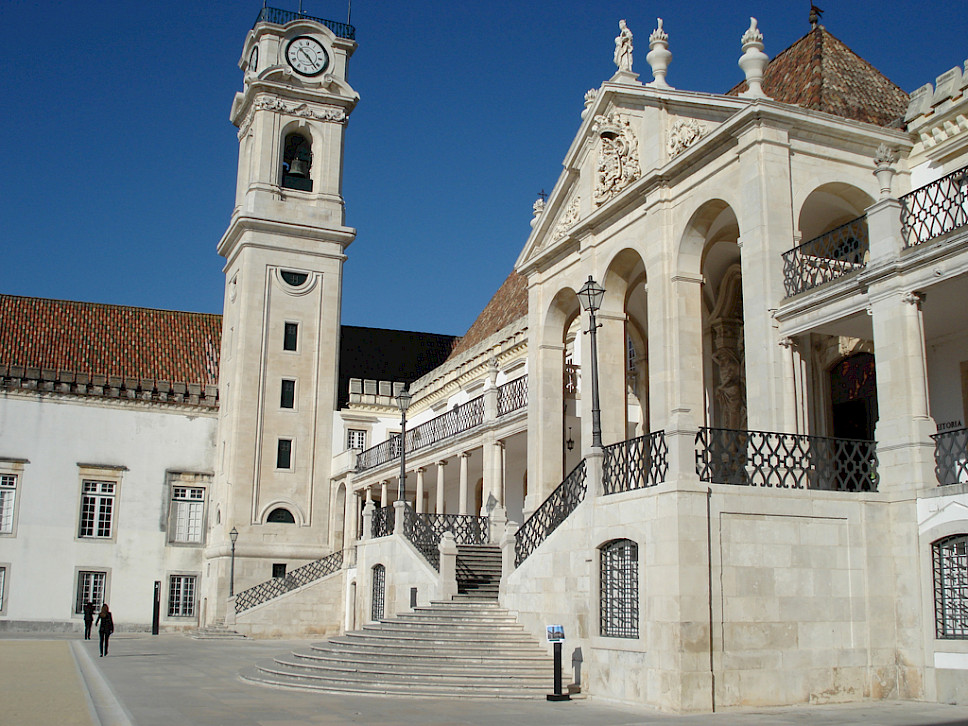Modos de Produzir: Artes Performativas e a Transição Ecológica
Modos de Produzir – As Artes Performativas e a Transição Ecológica é um seminário internacional dedicado à intersecção crítica entre a criação artística, as instituições culturais e a emergência ecológica. Ao longo de dois dias, propõe-se juntar uma comunidade de investigadores, artistas e agentes culturais em apresentações e debates envolvendo todos os participantes. A língua oficial do evento é o inglês.
Modes of Production - Performing Arts and the Ecological Transition
Modes of Production – Performing Arts in Transition is a Research & Development platform that intercrosses the field of artistic studies with the hybrid field of arts management and creative production.
Based at the Centre for Interdisciplinary Studies of the University of Coimbra (CEIS20-UC), it is the result of a partnership with the Artistic Studies Programme at the Faculty of Arts and Humanities, the Post-Graduate Diploma in Cultural Management and Sustainability and the Teatro Académico de Gil Vicente (TAGV-UC). Its initiatives and studies are carried out in permanent and updated articulation with practitioners and institutions in the arts and cultural sector. It analyses the modes of production and management models of arts and cultural projects and organizations in the face of several contemporary transformations, namely those that are raised by the demands of fair practices and social and environmental sustainability. It hosts the scientific FCT-funded GREENARTS project, which pays attention to the implications of the ecological imperative upon the arts and culture.
After an encouraging launch in the end of 2021 – which resulted in an edited volume soon to be published by transcript - we are now organizing a second International Seminar, this time a face-to-face meeting in Coimbra: one and a half days with presentations, debates and performances. Modes of Production – Performing Arts and the Ecological Transition signals the culmination of the GREENARTS project and will thus present its main results and host a series of discussions fully dedicated to the critical junction between the arts, cultural policy, and the ecological emergency.
The sense of urgency around ecological perils is growing unmistakably in the culture and creative sectors, including in the performing arts. The burgeoning mobilisation of the fields of theatre, dance and performance materializes in a constantly expanding proliferation of manifestos, artistic and institutional projects, policy initiatives, publications, and practical tools. This effervescence is driven by the steadily alarming warnings from scientists and activists, but it is also, importantly, akin to the sector’s heightened self-awareness. Artists, producers, and arts managers are more and more self-conscious about the environmental footprint of their own activities and increasingly invested in attuning themselves with the planetary emergency and its resulting inequalities. Importantly, they are also acutely aware of the overarching political implications of the ‘green transition’, and vigilant of the contradictions that such transformations entail when associated with specific geographical and historical circumstances (Rodrigues, 2024). Indeed, ecological distress is already impacting artistic and curatorial decisions, as well as challenging production, touring and management models (Janssens & Fraioli 2022; VoC, 2023; Vries 2021).
Modes of Production – Performing Arts and the Ecological Transition argues that the environmental emergency can rightly be seen as a major disorganiser of the modi operandi of the arts and culture field, insofar it questions the assumptions of cultural policies, the underpinnings of funding mechanisms, and the routines of creating, producing, managing, distributing, and experiencing art (Rodrigues, Oliveira and Ventura, 2024). At the same time, the widening demand for sustainability dramatically exposes the arts and culture’s overreliance on expansionist and productivist processes (Rodrigues, 2024) within a growth-oriented capitalist paradigm (Dragisevic Sesic, 2021).
While approaches from eco-dramaturgy, ecological theatre and eco-criticism have been consistently explored since at least the 1990s (Chaudhuri, 1994; Buell, 1999; Arons and May, 2012;) - either from pragmatic, thematic or aesthetic perspectives (Sermon, 2021) -, it is undeniable that only in this millennium, and most decidedly after the pandemic crisis -“a powerful revealer of our ecological condition” (Sermon, 2021:8) - have the arts been more systematically challenged to take on the role of raising awareness around the severity of the environmental crisis, making use of their storytelling capacity and of their ability to illuminate complex relationships between interdependent ecosystems (Skolczylas, 2021; Banerjee and Shreedhar, 2021). This is a crucial moment to question the performing arts’ willingness and capacity to take part in the great change in values inherent to ecological thinking, questioning anthropocentrism, redistributing agency, and establishing relationships with the more-than-human world. It is also an exciting time to look at the effects of the ecological challenge upon the artistic forms themselves: how are theatre, dance, or performance reinventing language and form to integrate an eco-responsibility? Could ‘multi-scalar aesthetics’ lead to a renewed ‘biological imagination’ and a ‘re-scaled’ relationship (Campos, 2022) between life and performance? Can ecological theatre resist being absorbed into ever more sophisticated forms of greenwashing?
Modes of Production – Performing Arts and the Ecological Transition will reflect and debate these issues, paying attention to formats, materials, processes, contexts and decisions.
Orador Principal
O autor e investigador apresentará no dia 27 de Junho a comunicação "A response-ability for radical complexity in artistic spaces of possibilities (and/or potentiality)".
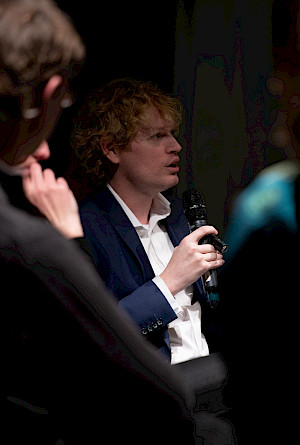
Ph: Detlev Hoffmann
Sacha Kagan é um cientista social e investigador cultural transdisciplinar, atualmente sediado na Alemanha, nas universidades de Hildesheim (como Investigador Principal de um projeto de investigação financiado pela DFG sobre “Queering Jewish Cultural Heritage in Europe”) e de Lueneburg, onde trabalhou como Investigador Associado (2005 a 2018). Anteriormente, coordenou a “Rede de Investigação: Sociologia das Artes” na Associação Europeia de Sociologia (2015 a 2017) e a rede cultural ”Cultura21 International: Cultural Fieldworks for Sustainability” (2007 a 2016). Recebeu o “Basarab Nicolescu Transdisciplinary Science and Engineering Award” (2018), é autor de mais de 70 publicações, realizador de três documentários e colaborador de uma dúzia de projectos artísticos.
Taxas de inscrição e participação
Inscrições abertas a 15 de Abril de 2024.
| De 15 de Abril a 6 de Junho | |
| Investigadores CEIS20 (integrados) | entrada livre |
| Estudantes UC | entrada livre |
| Estudantes (outros) | € 40,00 |
| Inscrição com comunicação* | € 80,00 |
| Inscrição sem comunicação | € 60,00 |
| *inclui almoços | |
| De 7 a 26 de Junho | |
| Investigadores CEIS20 (integrados) | entrada livre |
| Estudantes UC | entrada livre |
| Estudantes (outros) | € 50,00 |
| Inscrição com comunicação* | € 100,00 |
| Inscrição sem comunicação | € 80,00 |
| *inclui almoços |
Datas importantes
15 Abril – 6 Junho – Inscrições abertas – Early Bird Fee
7 Junho – 19 Junho - Inscrição regular - Regular Fee
20 Junho – 24 Junho – Inscrição tardia – Late Fee
27 + 28 Junho – Seminário em Coimbra
Contactos
Qualquer dúvida ou informação adicional contacte modesofproduction@uc.pt
Comissão Científica
Vânia Rodrigues, CEIS20-University of Coimbra, Portugal
Fernando M. Oliveira, CEIS20-University of Coimbra, Portugal
Kitija Balcare, Institute of Literature, Folklore and Art of the University of Latvia
Mário Montenegro, Marionet and CEIS20-University of Coimbra, Portugal
Julia Schade, Ruhr-University Bochum, Germany
Herman Bashiron-Mendolicchio, Cultural Management Programme, University of Barcelona
Jovana Karaulic, Faculty of Dramatic Arts, University of the Arts Belgrade, Serbia
Jordi Baltá Portolés, Blanquerna – Universitat Ramon Llull, Barcelona
Marcin Poprawski, Humak University of Applied Sciences, Finland
Comissão Organizadora
Vânia Rodrigues
Fernando Matos Oliveira
António Ventura
Informação útil
University Palace: Tower and Via Latina © UC, Cátia Marques
Alojamento:
Hotel Oslo (10% desconto mencionando o seminário):
Standard Room: 110€
Hotel Astoria (Preço especial com o código: CEIUC – Seminário 2024):
Single Room 75€
Double Room 80€
Casa de São Bento (preço especial)
Standard Room: 85€
Superior Room: 90€
Ibn Arrik (preço especial):
Standard room € 78
Superior room € 88
Suite € 110


